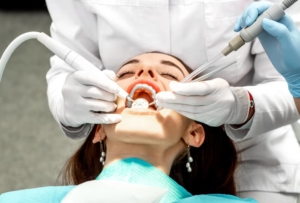Teeth Cleaning Edmonton
Your oral health impacts your everyday life. Our teeth play an important role in how we speak, smile, and chew food. If they’re causing you pain, your ability to do these things will be limited.
If you’ve been delaying your next dental cleaning, you might be putting your oral health in more danger than you’d think. Many patients wonder if it’s worth their time and money to have their teeth cleaned. Sure, you know they’ll feel smooth and look shiny afterward, but what if you don’t have any cavities? Is it still necessary to book a dental cleaning?
Our teeth cleaning in Edmonton and other dental services help our patients enjoy their lives to the fullest. Our dental hygienist will take care of your routine dental cleaning needs to prevent decay, gum disease, and bad breath.

Importance of Teeth Cleaning
Should you still visit the dentist if you don’t have a toothache or other oral health concerns? If you want to keep your teeth in top shape, we recommend scheduling teeth cleanings and regular dental checkups often.
The benefits of bi-annual cleanings include:
Prevention of Gum Disease
To detect early signs of gum disease, we will measure the periodontal pockets in your mouth—in other words, the distance between your teeth and your gums. If we notice any recession, we’ll make note of it, and educate you about how to prevent the progression of gum disease.
The first stage of gum disease is gingivitis; symptoms include bad breath and inflamed tissue. As it progresses, it reaches the advanced periodontitis stage, where teeth become loose and periodontist treatments are required. Gum disease is irreversible in later stages, but it can be prevented if it’s caught early on.
Maintaining your Oral Health
Visiting your dentist is a pivotal part of preserving your teeth. An oral health professional can detect issues early so that they don’t develop into bigger problems.
The risk of tooth decay is higher when your teeth have a buildup of tartar or calculus. This discoloured mineral is the result of hardened plaque; its sticky surface attracts bacteria, making it more likely that cavities will develop. Hardened plaque can only be removed by your dentist with the use of specialized tools.
Avoiding Dental Complications
Without regular professional teeth cleaning services, the enamel of your teeth can become eroded. This causes sensitivity and increases the likelihood of cavities.
Tooth decay is irreversible—once teeth are damaged, they need to be fixed. With restorative dental treatments, your dentist can fill cavities in your teeth to reduce pain and sensitivity.
Not only are dental issues uncomfortable, but they’re also more expensive. The cost of filling a small cavity is significantly less than extracting a damaged tooth. You can end up saving money by scheduling professional teeth cleaning twice a year.
Why is it Sensitive During an Appointment?
Do you find yourself wincing during dental treatments? If so, you might be hesitant to book your next cleaning. But why does this occur?
Those with sensitive teeth will find teeth cleanings less pleasant. Tooth surfaces are exposed to all sorts of damage, including acidic drinks, sugary foods, and the forces of your jaws.
Near the end of your teeth cleaning, your dentist will polish the surfaces of your teeth. Then, they’ll apply a fluoride treatment that protects your teeth against bacteria. If you want to maintain the benefits of fluoride between each professional teeth cleaning, you can use mouthwash or toothpaste that contains fluoride. Be sure to avoid rinsing your mouth, eating, or drinking water for at least 30 minutes after using fluoride to maximize its preventative benefits.
If patients are experiencing heightened sensitivity during their teeth cleaning, a dental hygienist can administer local anaesthesia to make the treatment less painful.
Let your dentist know if you’re experiencing regular tooth sensitivity. They can take a closer look at your teeth to identify a possible cause.
Why is it Sensitive After an Appointment?
You don’t deal with extensive tooth decay, but your gums still ache after an appointment. Why is that?
If you don’t floss regularly, you can expect your gums to bleed when your dentist does it. The removal of tartar may also cause sensitivity.
After a deep cleaning, your gums may be irritated and inflamed. This causes sensitivity in the hours following your treatment. Your dentist will inspect your mouth to examine each tooth for signs of decay, which can also cause some discomfort.
Be gentle on your mouth in the days that follow your cleaning. Avoid sharp, tough foods, and use a soft hand when brushing. With regular flossing and brushing, your sensitivity after a dental appointment will decrease.
Book an Appointment
Is it time to schedule your next teeth cleaning? We recommend that all of our patients schedule a professional teeth cleaning twice a year to prevent tooth decay and gum disease. Call our dental clinic in Edmonton today to book your next appointment.
